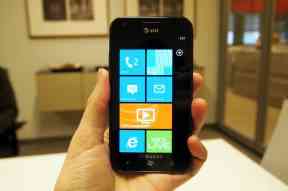
A video detailing the new features of Windows Phone 8 Apollo — originally intended for Microsoft’s smartphone partners — has leaked into the hands of PocketNow editors.
Yay!
In my opinion, Windows Phone Mango is a solid platform that’s quicker and smoother than anything I’ve seen on Android. Still, when looking at devices from Microsoft, Apple, and Google side-by-side, the Windows Phone always seems to lose in the spec department. That said, WinPho boss Joe Belfiore has plenty in store for us come Q4 2012 (the rumored release date of Apollo).
As far as hardware is concerned, Microsoft is ready to take it to the next level, adding support for multiple cores, NFC, and full microSD card storage. Apollo will also support four different screen resolutions, though Belfiore apparently wasn’t very forthcoming with specifics on those.
Developers are going to love this next part. According to PocketNow, developers will be able to use most of the same code when porting a Windows 8 app over to the Windows Phone platform. Of course, both platforms will share the same Metro-style interface, and that NFC radio will allow for tap-to-share capabilities between various Windows 8 devices.
Microsoft used to tout its Tango video chat app, but it would seem as thought that Skype acquisition isn’t going to waste. Windows Phone 8 will have Skype baked right in, taking video chat and VoIP calls to a much higher level of audio/visual quality. Redmond expects at least 100,000 apps in the Marketplace by the time Apollo launches, at which point developers will have native code support and the ability to implement app-to-app communication.
Now that most of our data plans are no longer unlimited, keeping track of data consumption is more important than ever. That said, Apollo will offer up a live tile for data usage called DataSmart. According to PocketNow, the feature will give precedence to WiFi connections. IE10 will include built-in server-side compression, which should reduce data usage, and the Local Scout tile will eventually hook you up with real-time locations of nearby hotspots.
Windows has always been a powerhouse in the enterprise, and it’s about time the same was true for Windows Phone. That said, Apollo will bring with it BitLocker encryption support for full-disk encryption, along with the option to deploy company-specific apps behind enterprise firewalls.
I’ve said it before and I’ll say it again: Windows Phone is on its way people, and with such a hearty update on the way, I’m only that more confident in my prediction. I’m in good company, too.
Source:http://techcrunch.com/2012/02/02/windows-phone-8-apollo-features-leak/
Yay!
In my opinion, Windows Phone Mango is a solid platform that’s quicker and smoother than anything I’ve seen on Android. Still, when looking at devices from Microsoft, Apple, and Google side-by-side, the Windows Phone always seems to lose in the spec department. That said, WinPho boss Joe Belfiore has plenty in store for us come Q4 2012 (the rumored release date of Apollo).
As far as hardware is concerned, Microsoft is ready to take it to the next level, adding support for multiple cores, NFC, and full microSD card storage. Apollo will also support four different screen resolutions, though Belfiore apparently wasn’t very forthcoming with specifics on those.
Developers are going to love this next part. According to PocketNow, developers will be able to use most of the same code when porting a Windows 8 app over to the Windows Phone platform. Of course, both platforms will share the same Metro-style interface, and that NFC radio will allow for tap-to-share capabilities between various Windows 8 devices.
Microsoft used to tout its Tango video chat app, but it would seem as thought that Skype acquisition isn’t going to waste. Windows Phone 8 will have Skype baked right in, taking video chat and VoIP calls to a much higher level of audio/visual quality. Redmond expects at least 100,000 apps in the Marketplace by the time Apollo launches, at which point developers will have native code support and the ability to implement app-to-app communication.
Now that most of our data plans are no longer unlimited, keeping track of data consumption is more important than ever. That said, Apollo will offer up a live tile for data usage called DataSmart. According to PocketNow, the feature will give precedence to WiFi connections. IE10 will include built-in server-side compression, which should reduce data usage, and the Local Scout tile will eventually hook you up with real-time locations of nearby hotspots.
Windows has always been a powerhouse in the enterprise, and it’s about time the same was true for Windows Phone. That said, Apollo will bring with it BitLocker encryption support for full-disk encryption, along with the option to deploy company-specific apps behind enterprise firewalls.
I’ve said it before and I’ll say it again: Windows Phone is on its way people, and with such a hearty update on the way, I’m only that more confident in my prediction. I’m in good company, too.
Source:http://techcrunch.com/2012/02/02/windows-phone-8-apollo-features-leak/

No comments:
Post a Comment